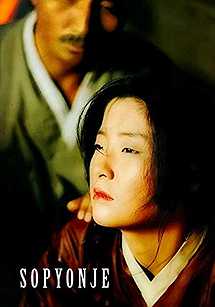
The specifically Korean tradition that is reclaimed in Sopyonje is the type of folk-song known as pansori, described as a musical sublimation of South-West Korea's collective grief and suffering - in other words, a kind of blues. The film's three central characters are itinerant pansori singers in the 1950s, a time when many aspects of Korean culture came under siege from Japanese and western influences. The story unfolds through flashbacks. A man named Dong-ho is roaming the rural hinterlands, ostensibly to find rare herbal medicines for his employer back in Seoul, but actually in search of Song-hwa, the woman he grew up with. Orphans, they were both apprenticed to the pansori master Yu-bong who pressured them to sacrifice everything for the art. Dong-ho rebelled and ran away, to become the man he is now. Song-hwa stayed, lost her sight, and outlived Yu-bong. Rumor has it that she is still traveling and still singing pansori... The tale has one truly shocking twist, but the overall one is plaintive, elegiac and serenely beautiful.

